Kinematic Inversions of Four Bar Chain, Slider Crank and Double Slider Crank Mechanism
KINEMATIC INVERSION
Inversions of mechanism: A mechanism is one in which one of the links of a kinematic chain is fixed. Different mechanisms can be obtained by fixing different links of the same kinematic chain. These are called as inversions of the mechanism. By changing the fixed link, the number of mechanisms which can be obtained is equal to the number of links. Excepting the original mechanism, all other mechanisms will be known as inversions of original mechanism. The inversion of a mechanism does not change the motion of its links relative to each other.
Four bar chain:
Fig 1.22 Four bar chain
One of the most useful and most common mechanisms is the four-bar linkage. In this mechanism, the link which can make complete rotation is known as crank (link 2). The link which oscillates is known as rocker or lever (link 4). And the link connecting these two is known as coupler (link 3). Link 1 is the frame.
Inversions of four bar chain:
Fig.1.23 Inversions of four bar chain.
Crank-rocker mechanism: In this mechanism, either link 1 or link 3 is fixed. Link 2 (crank) rotates completely and link 4 (rocker) oscillates. It is similar to (a) or (b) of fig.1.23.
Fig.1.24
Drag link mechanism. Here link 2 is fixed and both links 1 and 4 make complete rotation but with different velocities. This is similar to 1.23(c).
Fig.1.25
Double crank mechanism. This is one type of drag link mechanism, where, links 1& 3 are equal and parallel and links 2 & 4 are equal and parallel.
Fig.1.26
Double rocker mechanism. In this mechanism, link 4 is fixed. Link 2 makes complete rotation, whereas links 3 & 4 oscillate (Fig.1.23d)
Slider crank chain: This is a kinematic chain having four links. It has one sliding pair and three turning pairs. Link 2 has rotary motion and is called crank. Link 3 has got combined rotary and reciprocating motion and is called connecting rod. Link 4 has reciprocating motion and is called slider. Link 1 is frame (fixed). This mechanism is used to convert rotary motion to reciprocating and vice versa.
Fig1.27
Inversions of slider crank chain: Inversions of slider crank mechanism is obtained by fixing links 2, 3 and 4.
|
(a) crank fixed |
(b) connecting rod fixed |
(c) slider fixed |
Fig.1.28
Rotary engine – I inversion of slider crank mechanism. (crank fixed)
Fig.1.29
Whitworth quick return motion mechanism–I inversion of slider crank mechanism.
Fig.1.30
Crank and slotted lever quick return motion mechanism – II inversion of slider crank mechanism (connecting rod fixed).
Fig.1.31
Oscillating cylinder engine–II inversion of slider crank mechanism (connecting rod fixed).
Fig.1.32
Pendulum pump or bull engine–III inversion of slider crank mechanism (slider fixed).
Fig.1.33
Double slider crank chain: It is a kinematic chain consisting of two turning pairs and two sliding pairs.
Scotch –Yoke mechanism.
Turning pairs – 1&2, 2&3; Sliding pairs – 3&4, 4&1.
Fig.1.34: Scotch –Yoke mechanism.
Inversions of double slider crank mechanism:
Elliptical trammel. This is a device which is used for generating an elliptical profile.
Fig.1.35: Elliptical trammel
In fig. 1.35, if AC = p and BC = q, then, x = q.cosθ and y = p.sinθ.
This is the equation of an ellipse. The path traced by point C is an ellipse, with major axis and minor axis equal to 2p and 2q respectively.
Oldham coupling. This is an inversion of double slider crank mechanism, which is used to connect two parallel shafts, whose axes are offset by a small amount.
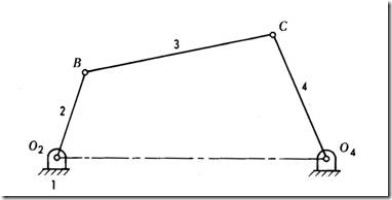
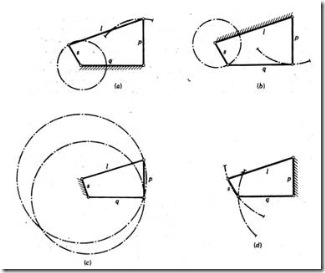
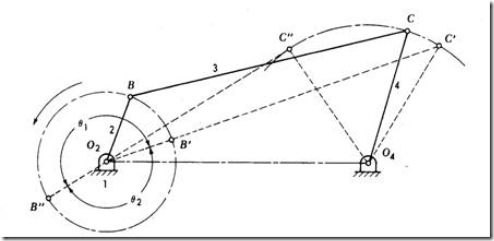
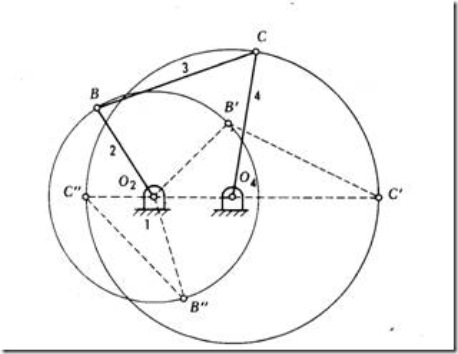
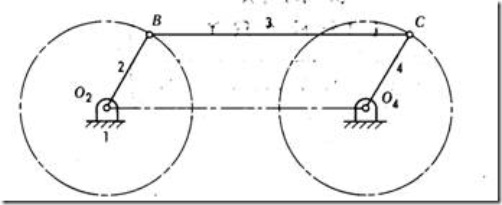
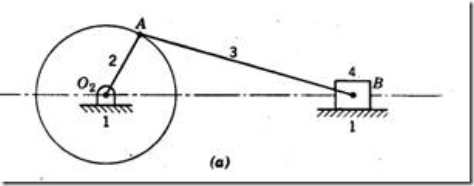
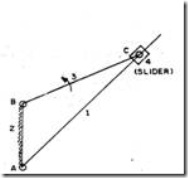
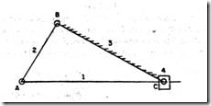

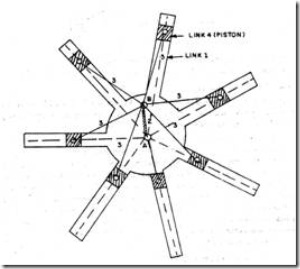
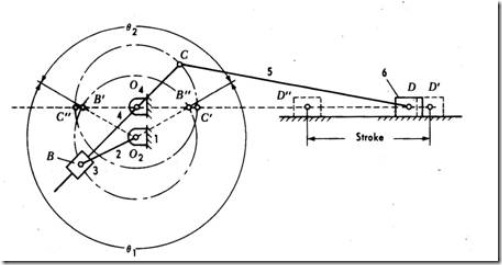
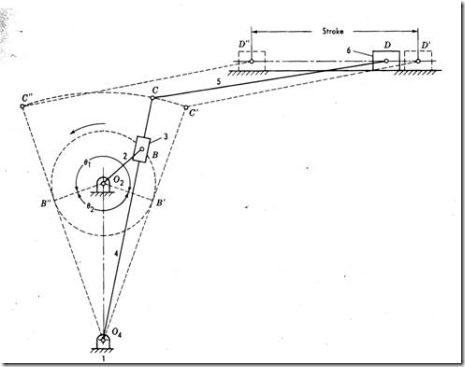
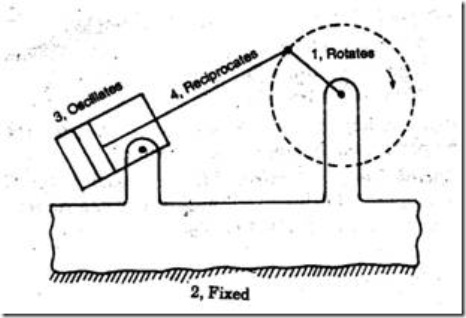
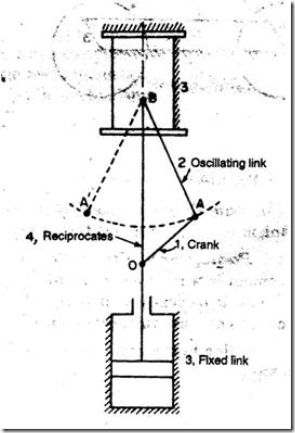
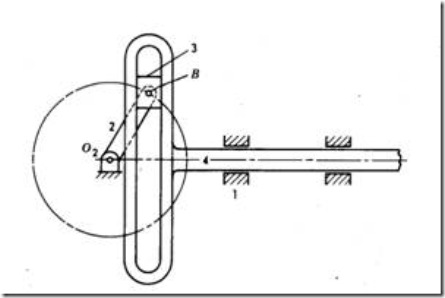
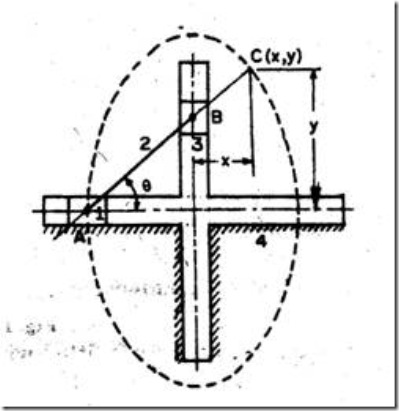

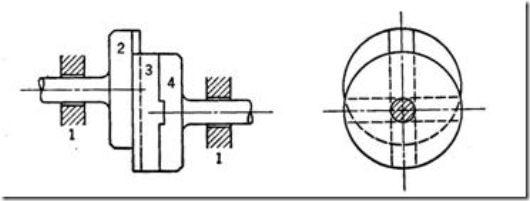
34 Responses to “Kinematic Inversions of Four Bar Chain, Slider Crank and Double Slider Crank Mechanism”
kishore
superb
vel
thank you so much of valuable notes
Dev
read the. topics……..
admin
Thanks
admin
Thanks for the appreciation.
admin
Thanks
shidesh manjare
that were be the nice one thankx for it
admin
Thanks, I will upload more like this.
manoj kumar
thank you a lot
admin
Thanks for linking it.
Engg
Please provide fourth inversion of this mechanism.
It is a kinematic chain consisting of two turning pairs and two sliding pairs.
admin
Thanks for the suggestion.. We will include for sure..
bhautik
thnaksssssssss
Gokul
Thanks
Robin Sebastian
thanks a lot..
venkat
Its clear thank you
Akash
awesome bcz of avoiding unuse of net n use of time ….
figure help full…
Yeshwanth Kumar
It s really simple & effective way of depiction.. Have bookmarked the page for future doubts….
lalit
Thanks
Mayank
Easy understand on consumption of less time…. Thanks
Md saquib
Thanks
Harish L&T
Very useful and summarised and easily can be understand the concept of mechanism.
singhrbalraj
This is nice…….and please add quick return mechanism also
aditya mohan shuryabanshi
this is best concept of mechenical
Engginering department
RAM AVATAR CHAURASIYA
me thankfull for such information in short and effective way.
mah
you are very good
admin
Thanks
ВалокБоровичи
RE:Kinematic Inversions of Four Bar Chain, Slider Crank and Double Slider Crank Mechanism – Engineering Tutorials Валок КПС Звенигово
gaurav
sir, is the degree of freedom a mechanism and its inversions is equal?
Ravi
Sir,, i need to know.. How double crank third inversion works
pradip
Its very important topics cover ……
Chandan
Thanks
Brian
How about a Free mantle four bar chain?can I get to know it please
DEWAGG
Heya i am for the first time here. I came across this board and I find It truly useful & it helped me out a lot.
I hope to give something back and aid others like you aided me.